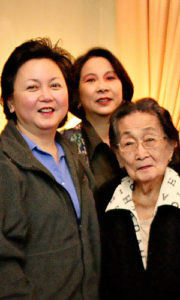Family Immigration

Settle/Re-unite in Canada with your Family
Family unification is an important priority for the Government of Canada, and there are a number of programs that are in place to aid and support this key Canadian value. Sadly, many people have a misunderstanding that it is not “their right” to sponsor whomever they wish, and only find out much later – years
even – that this is not necessarily the case. Below are some of the categories which summarize the family categories, designed to provide you an understanding of the options available under the Canadian Immigration System. 1st Avenue Immigration Consultant is here to guide you on how to leverage the programs to find the quickest and most cost-effective way to enter Canada so you can achieve your immigration goals. For an overview of the applicable categories and requirements, please see some of the options below or contact 1st Avenue Immigration Consultant Immigration Services TODAY for more information.
Click the status that applies to you for further details.

- Spouse: Someone who you are legally married to in either Canada or in another country and are compliant with the law of the country where the marriage took place. This can also extend to a same-sex spouse as this is recognized under Canadian law.
- Common Law Partner: This can either be a member of the opposite sex or of the same sex but what is important is that it is shown that you and your partner have been living in a conjugal relationship for at least one year (12 months) continuously.
- Conjugal Partner: This can refer to a member of the same sex or of the opposite sex who are in exceptional circumstances beyond their control that do not allow them to qualify as a common law partner or a spouse by living together. This is a relationship that is more than physical and it is characterized by a level of permanence and commitment where the 2 individuals rely on each other.
The process to sponsor under each of the noted categories above is relatively similar for each category.
Program Requirements
It is important to satisfy all of the requirements under this program and as such the person who wishes to sponsor a Spouse / Partner must:
- Be a Canadian Citizen or a Permanent Resident of Canada and at least 18 years of age.
- Be willing to sign an agreement with the government that as a sponsor they are financially responsible for the sponsored and any dependents for a period of 3 years after entering as a PRand upwards of 10 years for the dependents.
- Be able to show a legal marriage in either Canada or under the laws of the jurisdiction that it was carried out in.
- In the case of a Conjugal or Common Law Partner, evidence must be shown of a dependent relationship for a minimum of 1 year.
Lastly, regulations have been introduced by the Canadian Government to deter fraud in the form of “Marriages of Convenience” for people who have been married for less than 2 years and have no children. If this is you then the process remains the same but there are additional requirements where the people must remain together for a minimum of 2 years and also limits will be placed on the number of people who can be sponsored.
Program Privileges
Qualifying under this program will make the Spouse/Partner a Permanent Resident (PR). As a Permanent Resident the Spouse/Partner can do anything that a Canadian citizen can do except vote or join the military. Additionally this will entitle the Spouse/Partner to all of the other benefits extended to all Canadians and P.R.’s. Additionally after the Spouse/Partner satisfies the residency requirements as a PR they can then apply for Canadian Citizenship.

Program Requirements
It is important to satisfy all of the requirements under this program and as such the person who wishes to sponsor a dependent child must:
- Be a Canadian Citizen or a Permanent Resident of Canada.
- Be willing to sign an agreement with the government that they are willing to undertake the Sponsorship for 10 years or until the dependent child becomes 22 years old.
- If the child is 19 years old or older at the time of PR, then the sponsor is only responsible for a period of 3 years after entering the country.
- Meet the minimum financial obligations required by the government of Canada.
Program Privileges
Qualifying under this program will make the dependent child a Permanent Resident (PR). As a Permanent Resident the child can do anything that a Canadian citizen can do except vote or join the military. This will also entitle the child to all of other benefits that will be extended to them. Additionally after they satisfy the residency requirements as a PR then they can then apply for Canadian Citizenship.

- A Dependent Child; A Parent; A Grandparent; and/or A Spouse
However in and effort to keep families together and to show compassion, the government of Canada allows people to sponsor a relative other than those listed above if they are unmarried and have no other surviving relatives.
Program Requirements
It is important to satisfy all of the requirements under this program and as such the person who wishes to sponsor the relative from overseas must:
- Be a Canadian Citizen or a Permanent Resident of Canada.
- Be willing to sign an agreement with the government that they are willing to undertake the Sponsorship for 10 years or until the dependent child becomes 22 years old; 20 years for parents, grandparents and accompanying family members; 10 years for any other relative; 3 years after entering as a PR for spouses.
- For dependent children, on the earlier of 10 years or the child’s 22nd birthday; if the child is already 19 or older on PR, 3 years after entering.
- Meet the minimum financial obligations required by the government of Canada.
Program Privileges
Qualifying under this program will make the sponsored person a Permanent Resident (PR). As a permanent resident they can do anything that a Canadian citizen can do except vote or join the military. Additionally this will entitle them to all of the other benefits extended to all Canadians and P.R.’s. Additionally after they satisfy the residency requirements as a PR they can then apply for Canadian Citizenship.

Please Note: This program reached its capacity very quickly and the number of spots fluctuate. The program opens at the beginning of each year and you should plan ahead should you wish to take part. However, as an alternative, the government of Canada has extended a Super Visa, so families can travel freely and be with their children.
Program Requirements
It is important to satisfy all of the requirements under this program and as such the person who wishes to sponsor a Parent or Grandparent must:
- Be a Canadian Citizen or a Permanent Resident of Canada.
- Be willing to sign an agreement with the government that they are will to undertake the Sponsorship for 20 years and be responsible for all of the financial concerns of the sponsored.
- Meet the minimum financial obligations required by the government of Canada.
Program Privileges
Qualifying under this program will make the Parent / Grandparent a Permanent Resident (PR). As a permanent resident they can do anything that a Canadian citizen can do except vote or join the military. This will also entitle the sponsored person to all of other benefits that will be extended to them. Additionally after they satisfy the residency requirements as a PR then you can then apply for Canadian Citizenship.

As the Parent / Grandparent sponsorship program is currently on hold due to large backlogs, the Canadian government introduced “The Supervisa” so as to ensure that family members could come and visit for long durations in Canada. The visa is a 10-year visa and will allow people to come and stay upwards of 2 years at a time.
Program Requirements
It is important to satisfy all of the requirements under this program and as such the person who wishes to come to Canada on a Parent or Grandparent Super Visa must:
- Have a letter of invitation from their relative who is either a Canadian Citizen or PR of Canada.
- Show suitable financial capability to be able to support the invited guest(s) while in Canada.
- Show their ties to their home country and have valid travel documentation.
- Be able to show that they have the requisite Canadian Private Medical Coverage.
- Prove that they are criminally and medically admissible to Canada.
Of note, you might also need to submit additional documentation for a TRV (Temporary Resident Visa) if you are not from one of the following countries: Andorra, Antigua and Barbuda, Australia, Austria, Bahamas, Barbados, Belgium, Brunei, Croatia, Cyprus, Denmark, Estonia, Finland, France, Germany, Greece, Hungary, Iceland, Ireland, Israel, Italy, Japan, Latvia, Liechtenstein, Lithuania, Luxembourg, Malta, Monaco, Netherlands, New Zealand, Norway, Papua New Guinea, Poland, Portugal, Republic of Korea, St. Kitts and Nevis, San Marino, Singapore, Slovakia, Solomon Islands, Spain, Sweden, Slovenia, Switzerland, United Kingdom (including British Overseas citizens who are re-admissible and citizens of some British Dependant Territories), United States, Western Samoa.
Program Privileges
This is basically a long duration tourist visa specially designed for parents and grandparents and as such people who are on this visa are not entitled to work, or study (unless it is a short-term course) or access any of the social benefit system. It does allow for the family to be together and to be with their children and grandchildren while being part of the household here in Canada.

There are different sAlthough the federal government is in charge of Immigration for Canada (with certain exceptions in relation to Quebec) the government allows the provinces the ability to “nominate” people they wish to come to settle in their province. These programs are called PNP or “Provincial Nominee Programs”.
There are different streams in these programs and some provinces have family support streams where they allow family members to sponsor people, as long as they can provide them support. The process can open up different options but has some added steps and approvals at the provincial level.
Program Requirements
These programs are constantly changing and are different for each province. As such we have chosen not to list the requirements here as they are very specific and the information is quite dynamic in that it changes regularly.
Program Privileges
Being part of the PNP program is an excellent pathway to Canada and allows for people who would in some circumstances not qualify for Permanent Residency to apply and be successful with their application. In becoming a permanent resident you can do anything that a Canadian citizen can do except vote or join the military. Additionally this will entitle you to all of the other benefits extended to all Canadians and P.R.’s. Additionally, after you satisfy the residency requirements as a PR (stay in Canada for 3 out of 4 years) you can then apply for Canadian Citizenshiptreams in these programs and some provinces have family support streams where they allow family members to sponsor people, as long as they can provide them support. The process can open up different options but has some added steps and approvals at the provincial level.
Program Requirements
These programs are constantly changing and are different for each province. As such we have chosen not to list the requirements here as they are very specific and the information is quite dynamic in that it changes regularly.
Program Privileges
Being part of the PNP program is an excellent pathway to Canada and allows for people who would in some circumstances not qualify for Permanent Residency to apply and be successful with their application. In becoming a permanent resident you can do anything that a Canadian citizen can do except vote or join the military. Additionally this will entitle you to all of the other benefits extended to all Canadians and P.R.’s. Additionally, after you satisfy the residency requirements as a PR (stay in Canada for 3 out of 5 years) you can then apply for Canadian Citizenship

